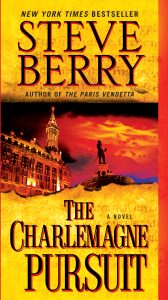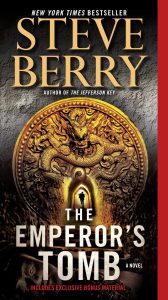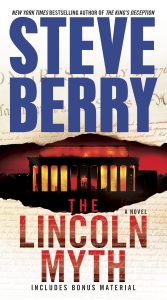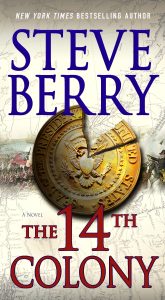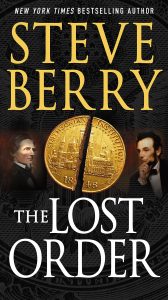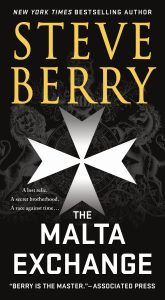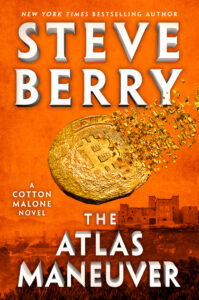The Templar Legacy
Cotton Malone Series Book 1
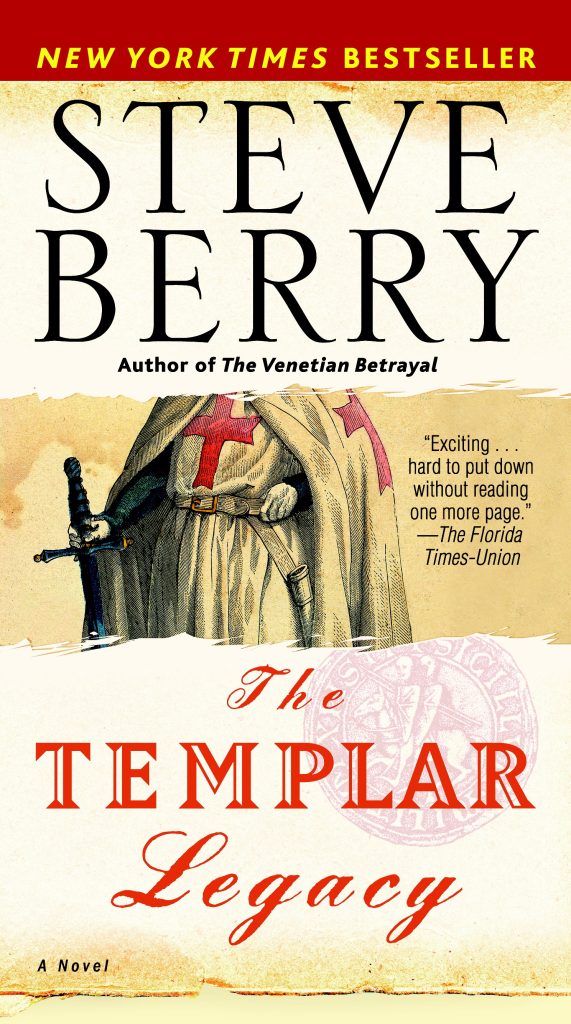 Buy the Book:
Buy the Book:Amazon
Apple Books
Barnes & Noble
IndieBound
Kobo
Audible
Libro.fm
Amazon Canada
Synopsis
The ancient order of the Knights Templar possessed untold wealth and absolute power over kings and popes—until the Inquisition, when they were wiped from the face of the earth, their hidden riches lost. But now two forces vying for the treasure have learned that it is not at all what they thought it was–and its true nature could change the modern world.
Cotton Malone, one-time top operative for the U.S. Justice Department, is enjoying his quiet new life as an antiquarian book dealer in Copenhagen when an unexpected call to action reawakens his hair-trigger instincts–and plunges him back into the cloak-and-dagger world he thought he’d left behind.
It begins with a violent robbery attempt on Cotton’s former supervisor, Stephanie Nelle, who’s far from home on a mission that has nothing to do with national security. Armed with vital clues to a series of centuries-old puzzles scattered across Europe, she means to crack a mystery that has tantalized scholars and fortune-hunters through the ages by finding the legendary cache of wealth and forbidden knowledge thought to have been lost forever when the order of the Knights Templar was exterminated in the fourteenth century. But she’s not alone. Competing for the historic prize–and desperate for the crucial information Stephanie possesses–is Raymond de Roquefort, a shadowy zealot with an army of assassins at his command.
Welcome or not, Cotton seeks to even the odds in the perilous race. But the more he learns about the ancient conspiracy surrounding the Knights Templar, the more he realizes that even more than lives are at stake. At the end of a lethal game of conquest, rife with intrigue, treachery, and craven lust for power, lies a shattering discovery that could rock the civilized world–and, in the wrong hands, bring it to its knees.
"A major twist midway through the story . . . the puzzles are so much fun . . . radical thinking of the Gospels that's sure to spark some lively debate. Pretty grabby stuff."
— Wall Street Journal
"Berry's skillful blend of political suspense and historical enigmas creates a storyline where long-lost secrets have the power to alter history. It ensnares readers in a web of intrigue and ancient mysteries.”
— NewsBytes (India)
"Berry's thriller . . . is not to be missed. Anagrams and complicated symbology abound, and comparisons to The Da Vinci Code are inevitable, but Berry distinguishes himself with a complex, well-written, and extremely readable story."
— Library Journal
"Blending history with fiction, Steve Berry gives you an entertaining thrill ride in the midst of a history lesson. It’s an amazing feat and truly worth the read."
— Muskogee Phoenix
"The Templar Legacy proves to be (Berry's) best effort: well plotted, well written, exciting, well researched and hard to put down without reading one more page . . . Berry does something (Dan) Brown did not with The Da Vinci Code - deliver a thinking man's religious thriller that's not-so-much about the chase but more about delivering a satisfying ending that suits the book's characters, ideas and themes."
— Florida Times-Union
"Da Vinci Code fans might experience a bit of deja vu, but The Templar Legacy is more thrilling than Davinci and its hero, Cotton Malone, is worth the price of admission."
— Redeye Chicago
"It has all the right ingredients . . . pacy, action-packed and intriguing, with a few twists along the way."
— The Advertiser & Sunday Mail (Australia)
"Well tooled . . . lively characters and action set pieces make this a more readable . . . version of the typical gnostic occult thriller. "
— Publishers Weekly
"The Templar Legacy certainly is more thrilling than the comparatively tame Da Vinci Code, . . . Ultimately, it is the hero of the tale, Cotton Malone, a former U.S. agent-turned-Copenhagen bookseller, who is worth the price of admission. Hopefully, he'll turn up in a Berry sequel."
— Detroit News
"The Templar Legacy . . . is in the style of Robert Ludlum, packed with murky action and protagonists, whose lives are constantly threatened . . . Berry does a good job. And for fans of Suduko, he provides a bonus --- cryptograms and clues that hold the keys."
— Orlando Sentinel
"Mixes well-etched locations with plenty of historical detail and speculation. The treasure hunt mechanics of the plot enable plenty of twists and false clues and there is an abundance of action and narrow escapes."
— Canberra Times (Australia)
"If you like your thrillers with a philosophical edge and don’t mind creeping around dark chambers hidden for centuries, then uncover (The Templar Legacy) for yourself.— (The Templar Legacy) stands on its own merits as an interesting thriller . . . (with) an ending that has all the elements of an old movie serial cliffhanger. It's worth reading."
— Roanoke Times
"Coded messages, Catholic conspirators, historical schemes, a deep and stunning surprise . . an exhausting read. Nonstop action."
— St. Louis Post-Dispatch
"Berry introduces Cotton Malone, a former U.S. Justice Department agent turned Copenhagen rare book dealer . . . (an) often absorbing novel . . . The Templar Legacy will likely satisfy history buffs, religious conspiracy buffs, puzzle buffs."
— Raleigh News-Observer
"Richly detailed and fantastically suspenseful, this thriller grips the reader for a wild literary ride that continues until the very last page."
— Tucson Citizen
"Steve Berry's writing is easy to read and tightly paced while his historical research brings authenticity to the plot."
— Western Advocate (Australia)
". . . sure to pique the interest of readers who favor suspense, ancient rites, clandestine societies, and lost treasure . . . Berry is no stranger to the world of cloak-and-dagger. . . . The Templar Legacy should find a reading audience that greatly appreciates the research and creativity Berry brings to this extraordinary work."
— Sunday Oklahoman
"Berry earned his bona fides as a thriller writer years ago, and it shows in his well-paced, efficiently written Templar Legacy. Also, he deserves kudos for daring to have a female heroine in her 60s . . . fans of the genre will find plenty to enjoy . . . "
— Christian Science Monitor
". . . an involving read, full of car chases, fistfights, shooting, ancient traps in ancient places and a few enjoyable plot surprises."
— Mercury News (San Jose, CA)
"Fans of cryptograms and puzzles will love the clues in this book, while religious conspiracy fans will enjoy the final revelation of what the Templar treasure actually is - no clues, you'll have to find out for yourself."
— Australian Broadcasting Corporation (ABC)
"Steve Berry doesn't leave any up his sleeves when he writes . . . The Templar Legacy satisfies my need for intrigue, action and history with a heavy dose of legend thrown in."
— Jackson Free Press
"While not impersonating Dan Brown's The DaVinici Code, Steve Berry's, The Templar Legacy . . . is a perfect book for a summer read."
— Deseret News (Salt Lake City)
"Another provocative and intriguing page-turner on the lines of DaVinci Code. A gripping adventure . . ."
— Deccan Herald (India)
"People will be talking about this book for some time to come."
— The Independent (Kansas City)
"The very best in the very crowded religious thriller genre. Berry's mystical tale of an ex-government agent on the trail of a history-changing document has just enough fact to make the fiction work beautifully. Better in all respects than The Da Vinci Code."
— Providence-Journal
"Berry's latest is simultaneously a history lesson and a spellbinding mystery. Danger is ever present, and the twists culminate in a breathtaking finale."
— Romantic Times
"It's a subtly engrossing book, meticulously crafted."
— Khaleej Times (Dubai)
". . . a Da Vinci Code-like thriller that engulfs its hero smack in the middle of a massive Knights Templar conspiracy. (Berry) packs his novel with arcane Gnostic lore but keeps his protagonist and his readers breathless to the end."
— Barnes & Noble
"Steve Berry has acquired a formidable reputation within the relatively short space of three novels. His latest work, The Templar Legacy, introduces readers to Cotton Malone. . . a likable, capable, and ultimately believable character . . . Berry sends Malone on a wild chase . . . that is equal parts cerebral and cataclysmic. The Templar Legacy. . . keeps Berry's string of winning novels intact."
— bookreporter.com
FROM THE BLOG WORLD
"This thrilling story is steeped in history. Its mysteries are ones that have enthralled generations. The plot's twists and turns make for intriguing reading, along a fascinating journey of intrigue, treachery, lust for power, and above all - the search for truth."
— bookloons.com
"Berry has created a suspenseful story for a group of interesting characters . . . readers will find The Templar Legacy literate and historical with characters and plot thoroughly engrossing."
— themysteryreader.com
"If you loved The Da Vinci Code, this is a book for you. The Templar Legacy is an intricately woven and vividly descriptive novel that straps you in within the first few pages and rarely slows to allow to take a breath . . . Berry has created a fiction from fact concerning a topic very few in this country know about, and has done a fantastic job."
— armchairinterviews.com
"Berry continually intrigues with a stand alone "thinking out of the box" story equal to Michael Crichton and surpassing Dan Brown."
— iloveamysterynewsletter.com
"Steve Berry has once again taken history and turned it into a fun, fast paced thriller full of plot twists and surprises. If you are a history and/or thriller fan you will enjoy The Templar Legacy."
— Lemuriabooks.com
"In The Templar Legacy, his fourth book, Berry has truly matched fascinating historical mystery with well-written, fast paced adventure. This is not a dry or ridiculous book riding on the coattails of Dan Brown's success. Berry is a well researched and skilled story teller whose work speaks for itself."
— mysteryone.com
"Tremendously entertaining with plenty of puzzles and secret codes along with gun battles and romance . . . Pure fun from start to finish."
— mysterylovers.com
"Steve Berry has come a long way in only four books; this one is undoubtedly his best. The plot crisscrosses, doubles back and winds around itself, the pace strong from the start and getting breakneck by the minute."
— bookswellread.com
"Nonstop suspense."
— Mary on bemarydouglass.blogspot.com
"You might also enjoy Steve Berry’s Cotton Malone series. The first in the series is The Templar Legacy. They’re a mix of history, treasure hunt, drama, suspense and intrigue. Comparable to Dan Brown, but so much better."
— www.faveread.com
Excerpt
CHAPTER ONE
COPENHAGEN, DENMARK
THURSDAY, JUNE 22, THE PRESENT
2:50 P.M.
Cotton Malone spotted the knife at the same time he saw Stephanie Nelle. He was sitting at a table outside the Café Nikolaj, comfortable in a white lattice chair. The sunny afternoon was pleasant and Højbro Plads, the popular Danish square that spanned out before him, bristled with people. The café was doing its usual brisk business—the mood feverish—and for the past half hour he'd been waiting for Stephanie.
She was a petite woman, in her sixties, though she never confirmed her age and the Justice Department personnel records that Malone once saw contained only a winking n/a in the space reserved for date of birth. Her dark hair was streaked with waves of silver, and her brown eyes offered both the compassionate look of a liberal and the fiery glint of a prosecutor. Two presidents had tried to make her attorney general, but she'd turned both offers down. One attorney general had lobbied hard to fire her—especially after she was enlisted by the FBI to investigate him—but the White House nixed the idea since, among other things, Stephanie Nelle was scrupulously honest.
In contrast, the man with the knife was short and stout, with narrow features and brush-cut hair. Something haunted loomed on his East European face—a forlornness that worried Malone more than the glistening blade—and he was dressed casually in denim pants and a blood-red jacket.
Malone rose from his seat but kept his eyes trained on Stephanie.
He thought of shouting a warning, but she was too far away and there was too much noise between them. His view of her was momentarily blocked by one of the modernistic sculptures that dotted Højbro Plads—this one of an obscenely obese woman, lying naked on her belly, her obtrusive buttocks rounded like windswept mountains. When Stephanie appeared from the other side of the cast bronze, the man with the knife had moved closer and Malone watched as he severed a strap that draped her left shoulder, jerked a leather bag free, then shoved Stephanie to the flagstones.
A woman screamed and commotion erupted at the sight of a purse snatcher brandishing a knife.
Red Jacket rushed ahead, Stephanie's bag in hand, and shouldered people out of his way. A few pushed back. The thief angled left, around another of the bronzed sculptures, and finally broke into a run. His route seemed aimed at Købmagergade, a pedestrian-only lane that twisted north, out of Højbro Plads, deeper into the city's shopping district.
Malone bounded from the table, determined to cut off the assailant before he could turn the corner, but a cluster of bicycles blocked his way. He circled the cycles and sprinted forward, partially orbiting a fountain before tackling his prey.
They slammed into hard stone, Red Jacket taking most of the impact, and Malone immediately noticed that his opponent was muscular. Red Jacket, undaunted by the attack, rolled once, then brought a knee into Malone's stomach.
The breath left him in a rush and his guts churned.
Red Jacket sprang to his feet and raced up Købmagergade.
Malone stood, but instantly crouched over and sucked a couple of shallow breaths.
Damn. He was out of practice.
He caught hold of himself and resumed pursuit, his quarry now possessing a fifty-foot head start. Malone had not seen the knife during their struggle, but as he plowed up the street between shops he saw that the man still grasped the leather bag. His chest burned, but he was closing the gap.
Red Jacket wrenched a flower cart away from a scraggly old man, one of many carts that lined both Højbro Plads and Købmagergade. Malone hated the vendors, who enjoyed blocking his bookshop, especially on Saturdays. Red Jacket flung the cart down the cobbles in Malone's direction. He could not let the cart run free-too many people on the street, including children-so he darted right, grasped hold, and twisted it to a stop.
He glanced back and saw Stephanie round the corner onto Købmagergade, along with a policeman. They were half a football field away, and he had no time to wait.
Malone dashed ahead, wondering where the man was heading. Perhaps he'd left a vehicle, or a driver was waiting where Købmagergade emptied into another of Copenhagen's busy squares, Hauser Plads. He hoped not. That place was a nightmare of congestion, beyond the web of people—only lanes that formed the shoppers' mecca known as Strøget. His thighs ached from the unexpected workout, the muscles barely recalling his days with the Navy and the Justice Department. After a year of voluntary retirement, his exercise regimen would not impress his former employer.
Ahead loomed the Round Tower, nestled firmly against the Trinity Church like a thermos bound to a lunch pail. The burly cylindrical structure rose nine stories. Denmark's Christian IV had erected it in 1642, and the symbol of his reign—a gilded 4 embraced by a c—glistened on its somber brick edifice. Five streets intersected where the Round Tower stood, and Red Jacket could choose any one of them for his escape.
Police cars appeared.
One screeched to a stop on the south side of the Round Tower. Another came from farther down Købmagergade, blocking any escape to the north. Red Jacket was now contained in the plaza that encircled the Round Tower. His quarry hesitated, seeming to appraise the situation, then scampered right and disappeared inside the Round Tower.
What was the fool doing? There was no way out besides the ground-floor portal. But maybe Red Jacket didn't know that.
Malone ran to the entrance. He knew the man in the ticket booth. The Norwegian spent many hours in Malone's bookshop, English literature his passion.
"Arne, where did that man go?" he asked in Danish, catching his wind.
"Ran right by without paying."
"Anybody up there?"
"An older couple went up a little while ago."
No elevator or stairs led to the top. Instead, a spiral causeway wound a path straight to the summit, originally installed so that bulky seventeenth-century astronomical instruments could be wheeled up. The story local tour guides liked to tell was of how Russia's Peter the Great once rode up on horseback while his empress followed in a carriage.
Malone could hear footfalls echoing from the flooring above. He shook his head at what he knew awaited him. "Tell the police we're up there."
He started to run.
Halfway up the spiraling incline he passed a door leading into the Large Hall. The glassed entrance was locked, the lights off. Ornamented double windows lined the tower's outer walls, but each was iron-barred. He listened again and could still hear running from above.
He continued ahead, his breathing growing thick and hampered. He slowed his pace when he passed a medieval planet plotter affixed high on the wall. He knew the exit onto the roof platform was just a few feet away, around the ramp's final bend.
He heard no more footsteps.
He crept forward and stepped through the archway. An octagonal observatory—not from Christian IV's time, but a more recent incarnation—rose in the center, with a wide terrace encircling.
To his left a decorative iron fence surrounded the observatory, its only entrance chained shut. On his right, intricate wrought-iron latticework lined the tower's outer edge. Beyond the low railing loomed the city's red-tiled rooftops and green spires.
He rounded the platform and found an elderly man lying prone. Behind the body, Red Jacket stood with a knife to an older woman's throat, his arm encasing her chest. She seemed to want to scream, but fear quelled her voice.
"Keep still," Malone said to her in Danish.
He studied Red Jacket. The haunted look was still there in the dark, almost mournful eyes. Beads of sweat glistened in the bright sun. Everything signaled that Malone should not step any closer. Footfalls from below signaled that the police would arrive in a few moments.
"How about you cool down?" he asked, trying English.
He could see the man understood him, but the knife stayed in place. Red Jacket's gaze kept darting away, off to the sky then back. He seemed unsure of himself and that concerned Malone even more. Desperate people always did desperate things.
"Put the knife down. The police are coming. There's no way out."
Red Jacket looked to the sky again, then refocused on Malone. Indecision stared back at him. What was this? A purse snatcher who flees to the top of a hundred-foot tower with nowhere to go?
Footfalls from below grew louder.
"The police are here."
Red Jacket backed closer to the iron railing but kept his grip tight on the elderly woman.
Malone sensed the steeliness of an ultimatum forcing some choice, so he made clear again, "There's no way out."
Red Jacket tightened his grip on the woman's chest, then he staggered back, now firmly against the waist-high outer railing, nothing beyond him and his hostage but air.
The eyes lost their panic and a sudden calm swept over the man. He shoved the old woman forward and Malone caught her before she lost her balance. Red Jacket made the sign of the cross and, with Stephanie's bag in hand, pivoted out over the railing, screamed one word—"beauseant"—then slashed the knife across his throat as his body plunged to the street.
The woman howled as the police emerged from the portal.
Malone let her go and rushed to the rail.
Red Jacket lay sprawled on the cobbles one hundred feet below.
He turned and looked back to the sky, past the flagpole atop the observatory, the Danish Dannebrog—a white cross upon a red banner—limp in the still air.
What had the man been looking at? And why did he jump?
He gazed back down and saw Stephanie elbowing her way through the growing crowd. Her leather bag lay a few feet from the dead man and he watched as she yanked it from the cobbles, then dissolved back into the spectators. He followed her with his gaze as she plowed through the people and scuttled away, down one of the streets that led from the Round Tower, deeper into the busy Strøget, never looking back.
He shook his head at her hasty retreat and muttered, "What the hell?"
Also in this series:


